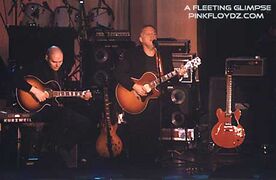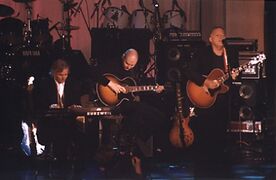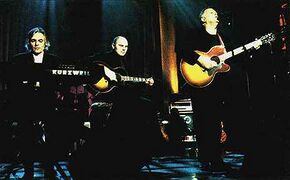Billy Corgan 1996-01-17: Difference between revisions
mNo edit summary |
MusikAnimal (talk | contribs) No edit summary |
||
| Line 15: | Line 15: | ||
}} | }} | ||
[[w:Pink Floyd|Pink Floyd]]'s induction into the [[w:Rock and Roll Hall of Fame|Rock and Roll Hall of Fame]]. [[Billy Corgan]] gives their induction speech | '''January 17, 1996''' was [[w:Pink Floyd|Pink Floyd]]'s induction into the [[w:Rock and Roll Hall of Fame|Rock and Roll Hall of Fame]]. [[Billy Corgan]] gives their induction speech, roughly six minutes long, opening with "I know it's a little late, I'll keep my remarks to the length of an average Pink Floyd song." He then joined the band on guitar for a performance of "Wish You Were Here". Corgan praised the song in his speech and how it helped him come to terms with his grandmother's cancer diagnosis when he was 17 years old. | ||
== Setlist == | == Setlist == | ||
Latest revision as of 03:08, 16 January 2022
| January 17, 1996 – New York City, NY, US | |
|---|---|
| Live performance by Pink Floyd featuring Billy Corgan | |
| Artist | Pink Floyd |
| Date | January 17, 1996 |
| Venue | Waldorf Astoria |
| Coordinates | 40°45′23″N 73°58′27″W |
| Location | New York City, NY, US |
| Venue type | Ballroom |
| Personnel | David Gilmour, Nick Mason, Richard Wright, Billy Corgan |
| Order of bands | Pink Floyd |
January 17, 1996 was Pink Floyd's induction into the Rock and Roll Hall of Fame. Billy Corgan gives their induction speech, roughly six minutes long, opening with "I know it's a little late, I'll keep my remarks to the length of an average Pink Floyd song." He then joined the band on guitar for a performance of "Wish You Were Here". Corgan praised the song in his speech and how it helped him come to terms with his grandmother's cancer diagnosis when he was 17 years old.
Setlist[edit | edit source]
- (induction speech)
- "Wish You Were Here" [Pink Floyd] (live debut)
Banter[edit | edit source]
BC: Hi. I know it's a little late, I'll keep my remarks to the length of an average Pink Floyd song. I'd like to start with some personal reflections. I grew up in the ‘70s and ‘80s, I'm roughly 28 years old and when people would say Pink Floyd, before I even heard a note, there was a certain reverence that surrounded this band. They were a strange anomaly in the ‘70s, filled with this horrible, awful music, which some of you in this room are responsible for. Pink Floyd was this mix of so many things. They were a mysterious band, you didn't really know what they looked like most of the time. They had amazing artwork that had pyramids and prisms and crazy things. And the first album I heard was Dark Side of the Moon, which as we all know, is probably one of the best albums of all time. It was their--probably their crowning achievement as far as people knowing what it was they did. I first heard this album in The Wall era, which to me at my tender age of 14 was too creepy, too intense, too nihilistic and uh, of course, these are all the things I believe in now. Through Dark Side of the Moon, I sought out their other albums and I became a fan. When I was 17 years old, my grandmother was diagnosed with cancer and it was one of the most painful periods of my life. And the Pink Floyd song Wish You Were Here seemed to sum up everything I was feeling. And when I couldn't take what was going on in my life with her dying, I listened to that song over and over and it still makes me cry, it's such a beautiful song. You know when you're 17, “heaven from hell, blue skies from pain,” it means a lot. And so, this is why I think I'm here at this particular moment, to thank them for everything that they've ever done. Pink Floyd are the ultimate rock and roll anomaly: they sold massive amounts of records, have always been a popular live band and they’re not a--they were never a singles driven band, a lesson forever needed to be learned in this particular business. Because they've always stood for--been about--music. And why? Because it is the people who listen to music that drives the business, not the other way around, and they've always been a band that’s thought about the fan first and I have a lot of respect for them about that. They've always been everything that's great about rock: grandeur, pomposity, nihilism, humor and, of course, space. So when I was asked to do this, I thought, “Well, you know, I could come out here and go on and on about the mystery and mythology of Pink Floyd,” but I thought I'd actually go back and listen to a lot of the records that I had impressions with and had listened to, but go back as an adult, per se, and really kind of delve in to this band. So I started with the first record and of course with Pink Floyd, it’s always, uh, the very root of Pink Floyd surrounds the genesis with Syd Barrett and as we all know, we’re...(light clapping from crowd)...yes sir. You know, we’re so consistently amazed in rock and roll with tragedy and beauty and Syd was both. His original artistic vision that's expressed on the first Pink Floyd record really defined what this band still continues to be, an exploration into the outer terrains of whatever it is that makes music happen. I'd just like to spotlight a couple records that really to me define what Pink Floyd's all about. After Syd went wherever Syd went, I listened to some of the records after that and they really sounded like a band unsure of where to go. And I've even read things that they felt this way, so I don't feel bad saying that. And it wasn't until the record that they put out called Meddle that suddenly it had that sound, you know, galloping horses and astral planes and echoes and...it's really on that record that you hear a band fusing and synthesizing something that's never been really recreated. Of course, Dark Side of the Moon, the ultimate synthesis of sound and vision and lyrics. It stands as a great crowning achievement in music. And when you--again, when you really think about what kind of band Pink Floyd has been and when you think about that album, being one of the most successful albums of all time, and you think of everything that surrounds it, it still surprises me to this day that we don't look for more Pink Floyds and less whoever’s on top of the charts at this particular moment. So what did Pink Floyd do after Dark Side of the Moon? They made an album that was completely uncommercial, heh. They wrote a nine part ode to their former colleague Syd, Shine On You Crazy Diamond. It's a very poignant thing that they took the time to do this. And it was a very, very brave record to make because, even as I've read things that they've said, they felt a lot of pressure to follow up the success of Dark Side of the Moon. The other thing I'd like to point out is the album The Wall, which as I said, when I was 14 years old, was beyond my conception. But at 28 years old, it's one of the bravest records I've ever heard. And I really can't point to anything else that's ever summed up everything that's fucked up about life, everything that's fucked up about rock. It takes on politics, hero worship, rock and roll and our desires to connect with the universe, all in one fell swoop. It really truly is an amazing testament to how far they were willing to go to reach the outer limits of what's important. Listening to all this music, I came up with the simple question: “Who's Pink?” And...heh heh heh. And uh, even by the band's admission, the band Pink Floyd is really bigger than any particular individual. And we are here tonight inducting as much an institution--you have to excuse the pun--as the particular members of the band. They've survived everything and I don't personally know all the politics between them all, but we have the music as a legacy. So I personally and I hope all of you will salute the legacy of their bravery, courage, spirit and ultimately, their music. It's a great legacy and I wish that um, I wish them all well. Pink Floyd. (Money plays)
[speeches cut]






